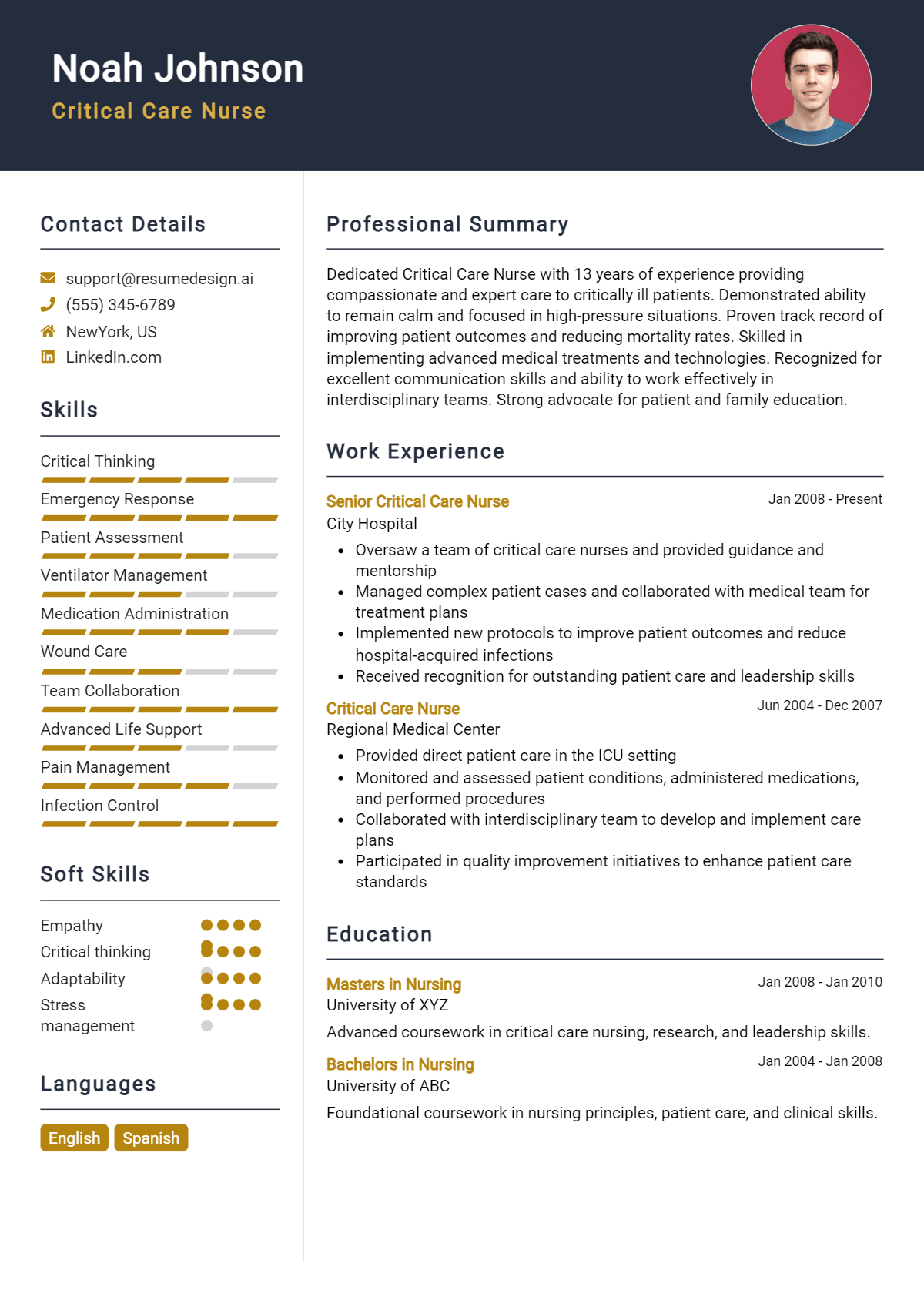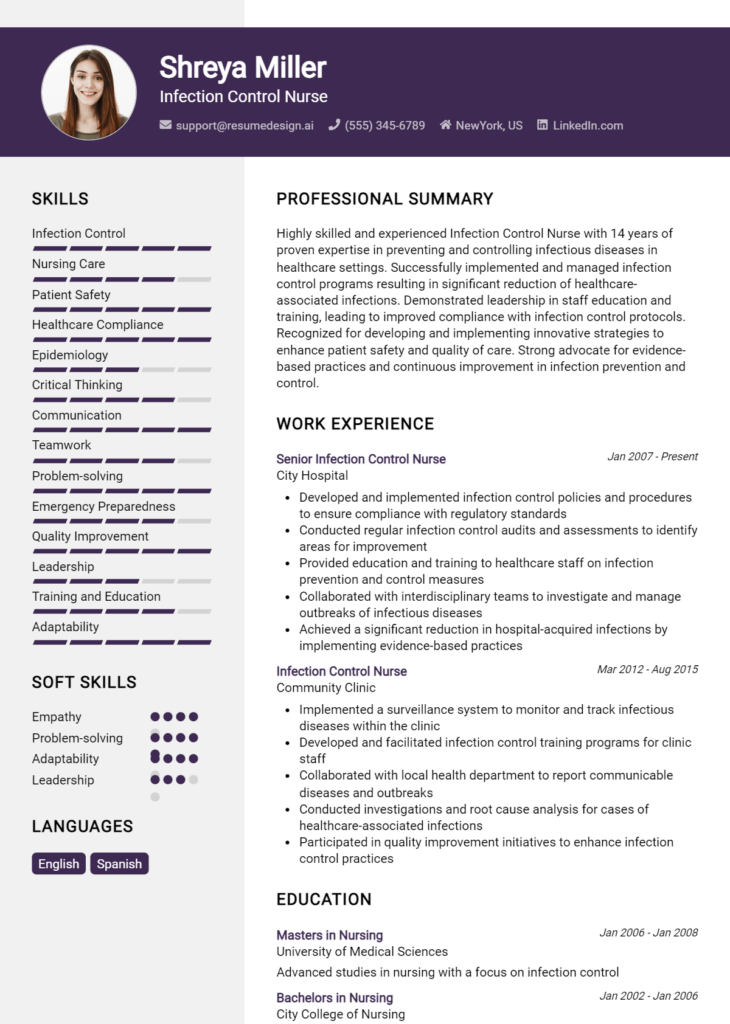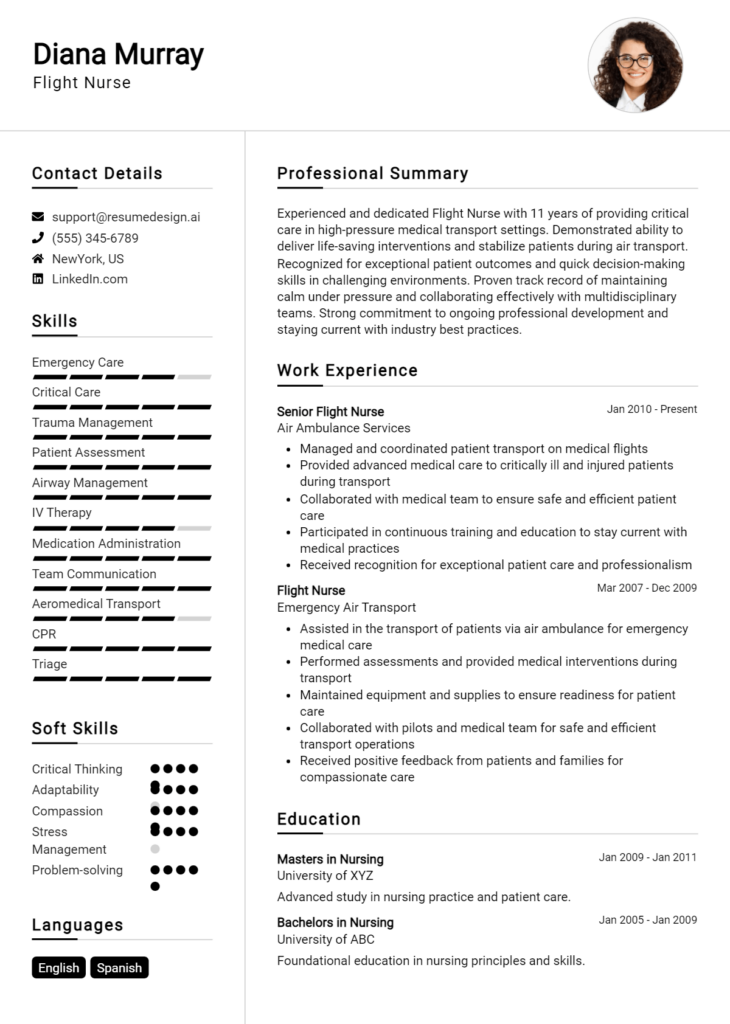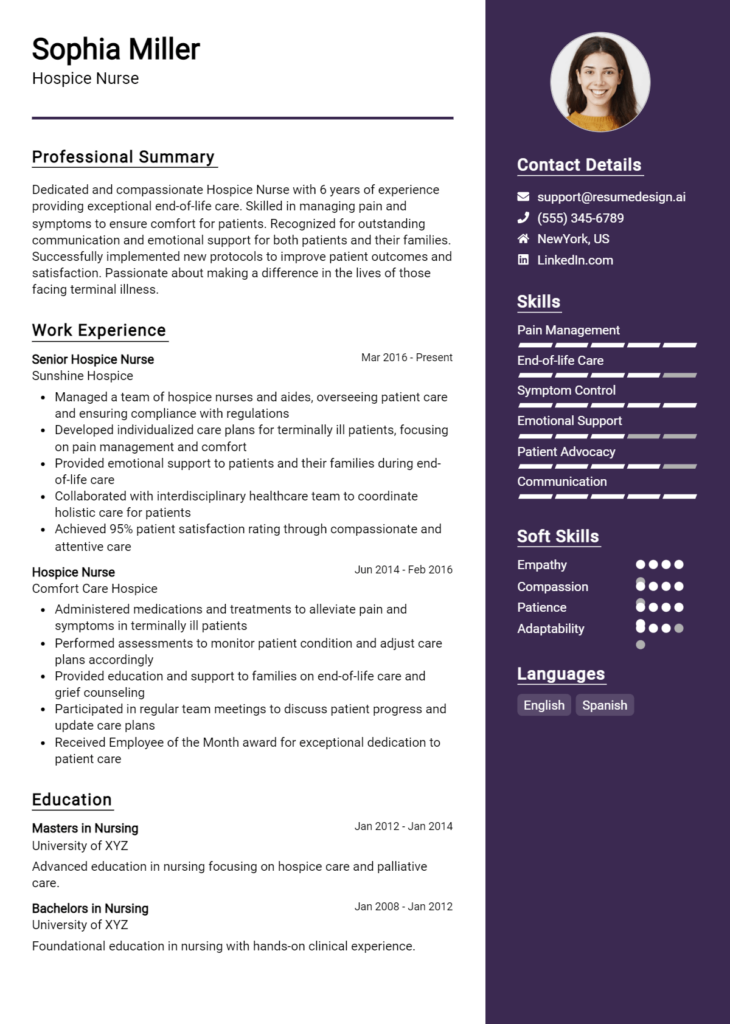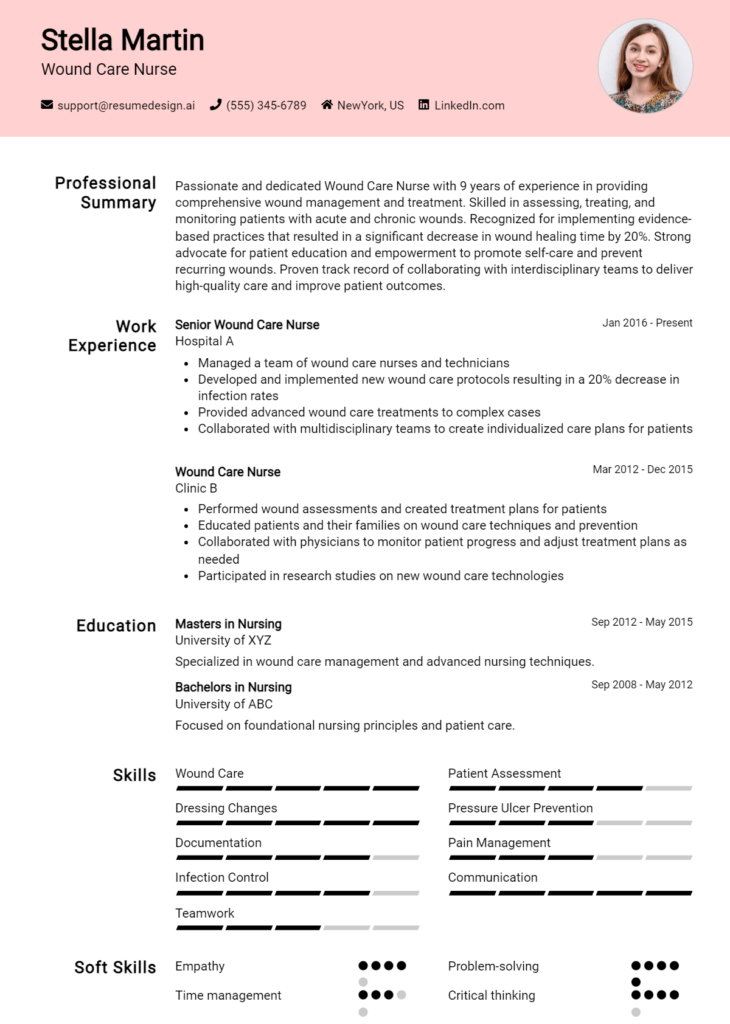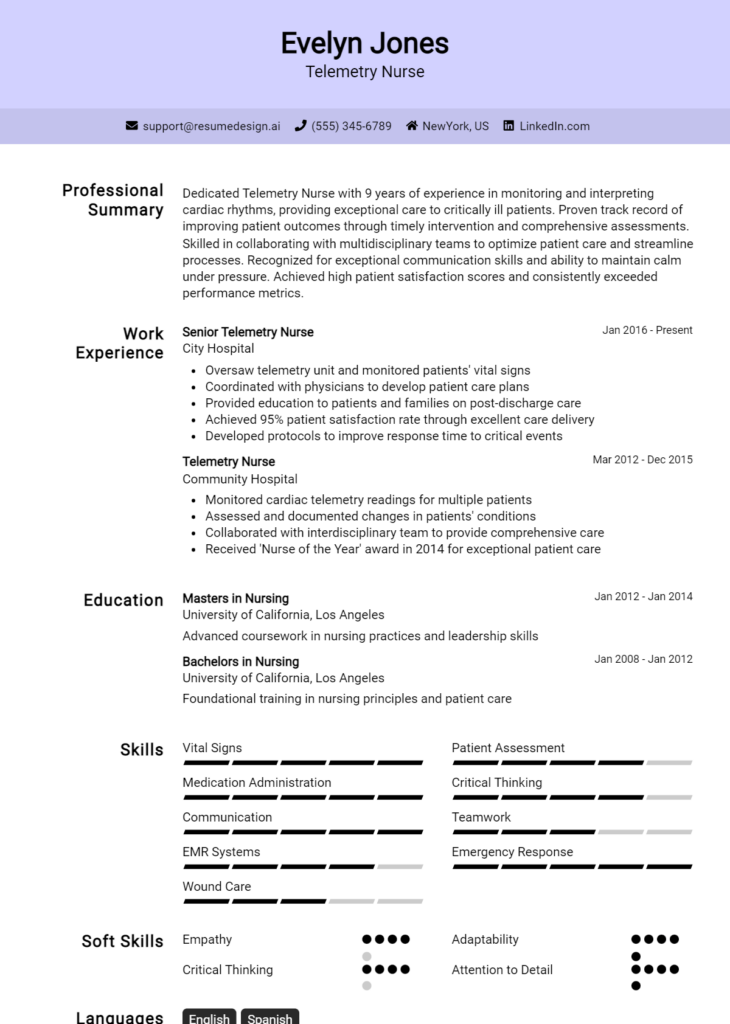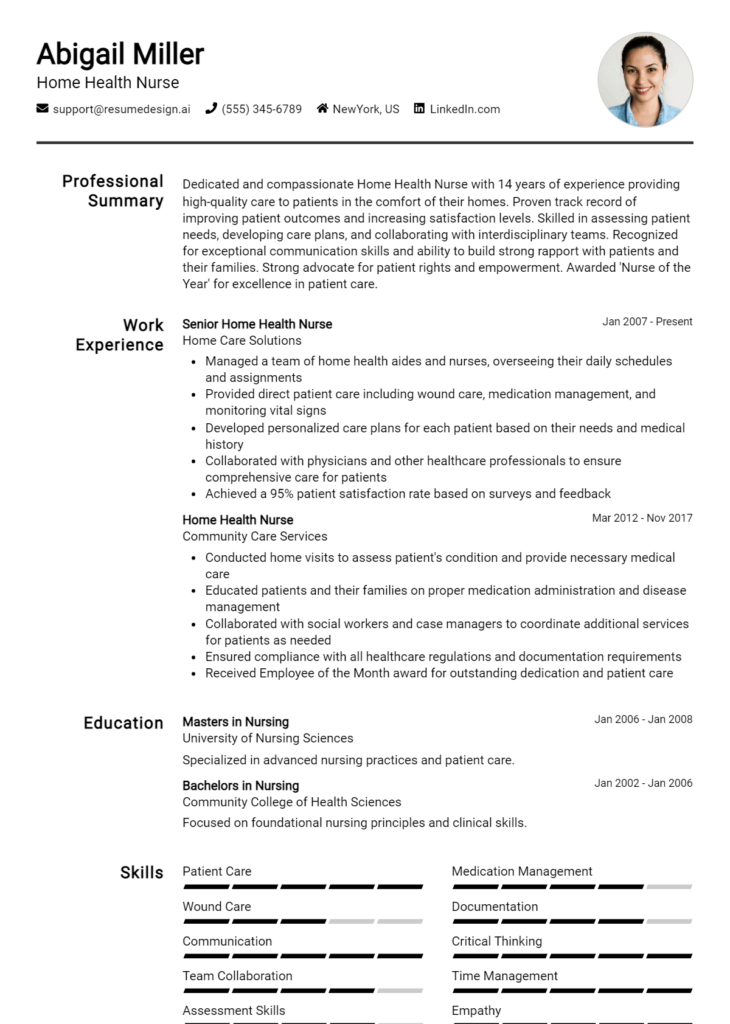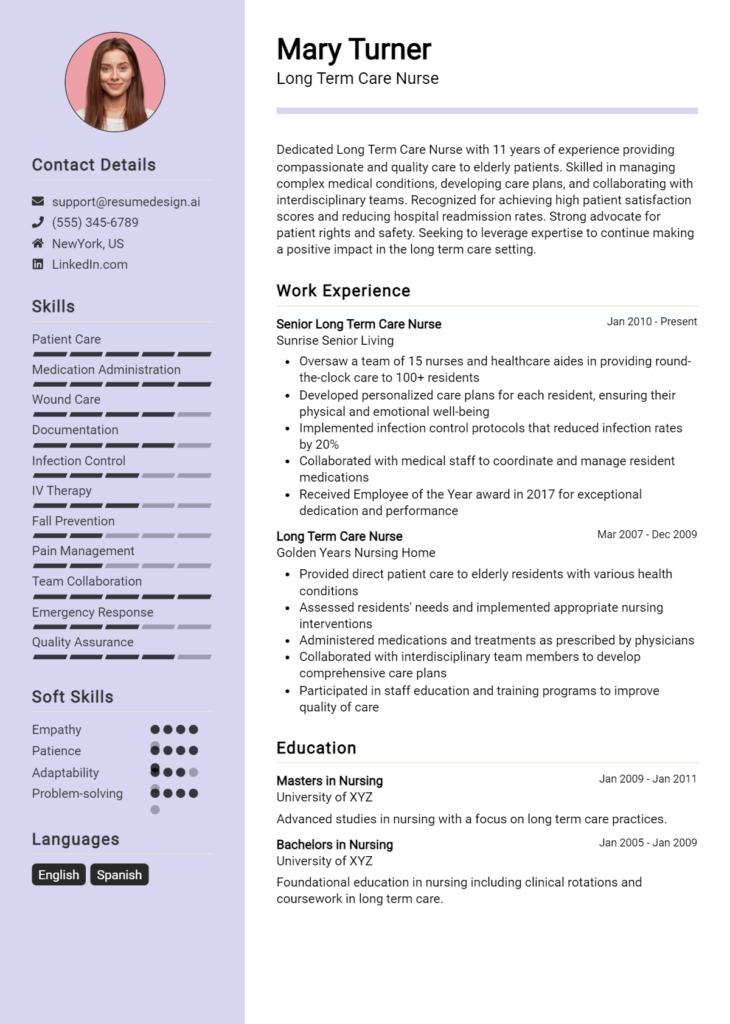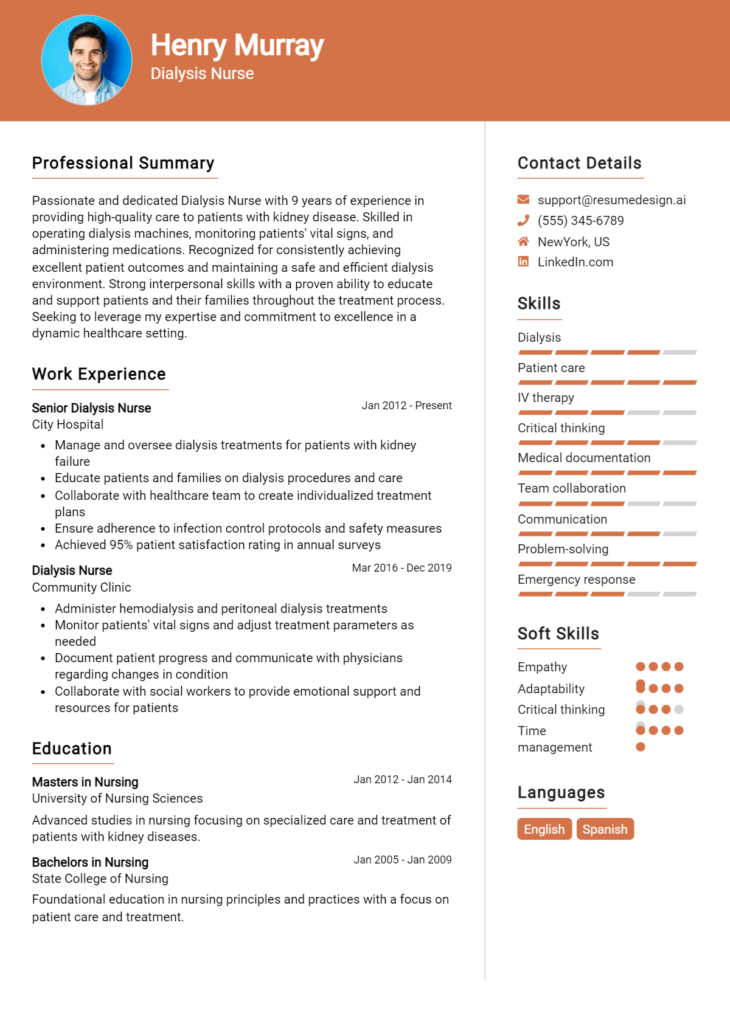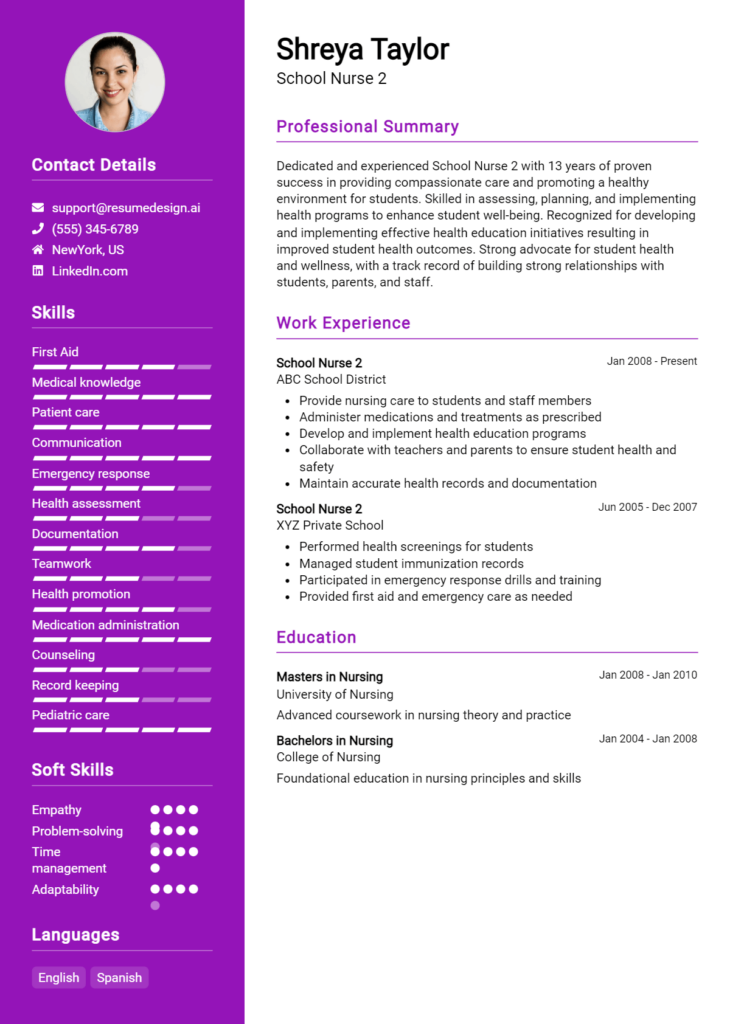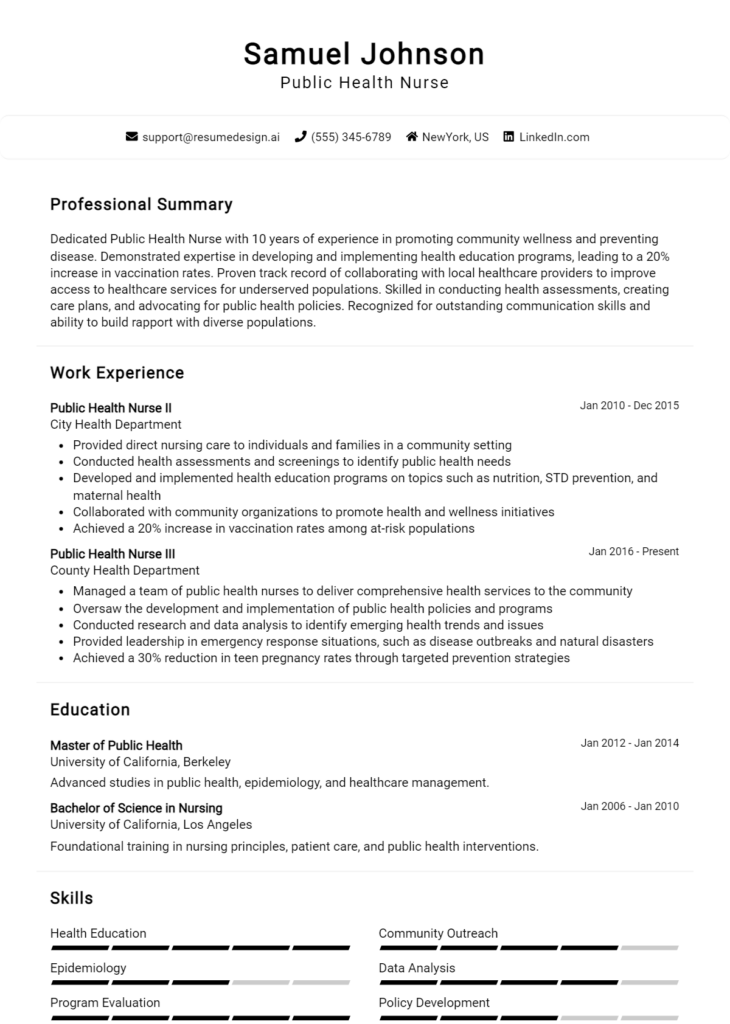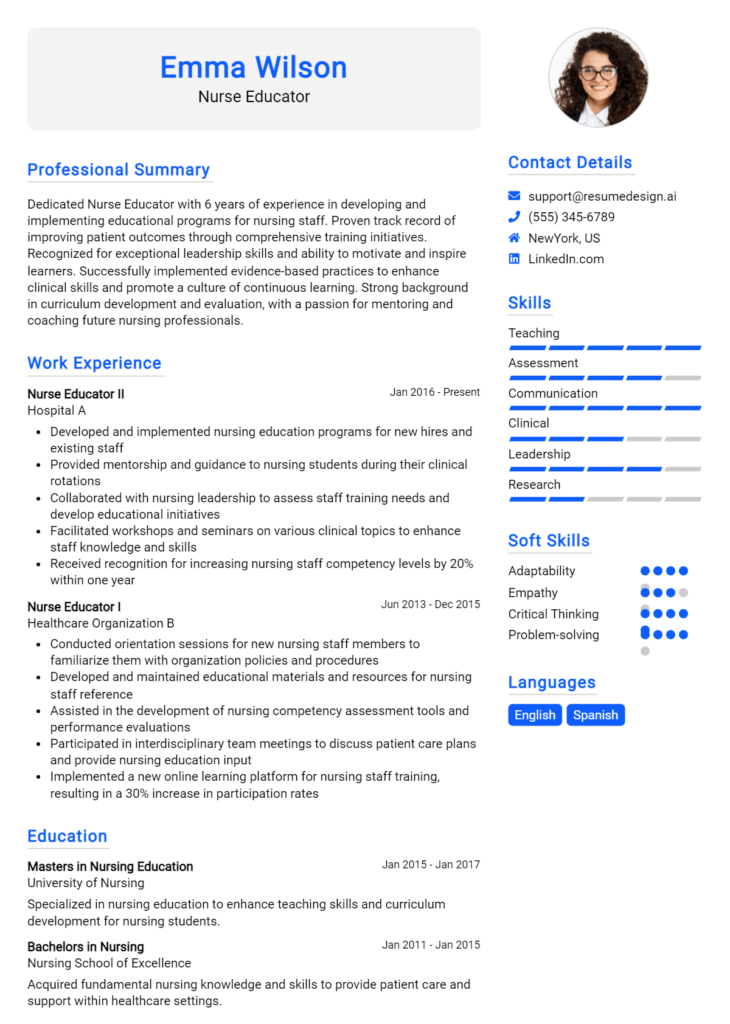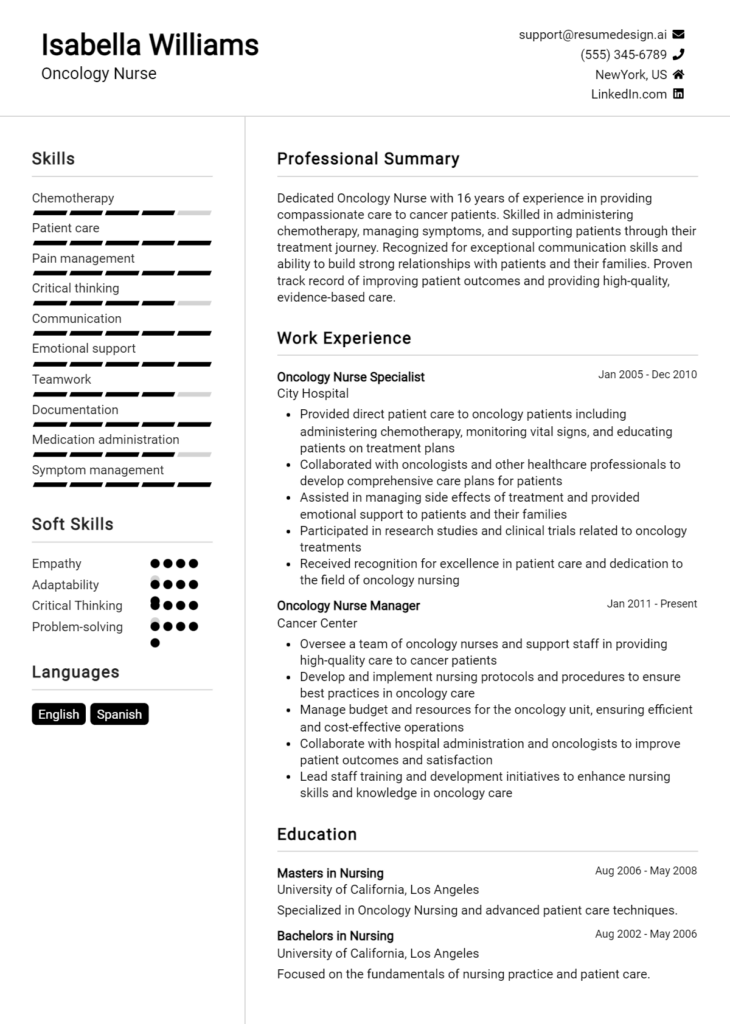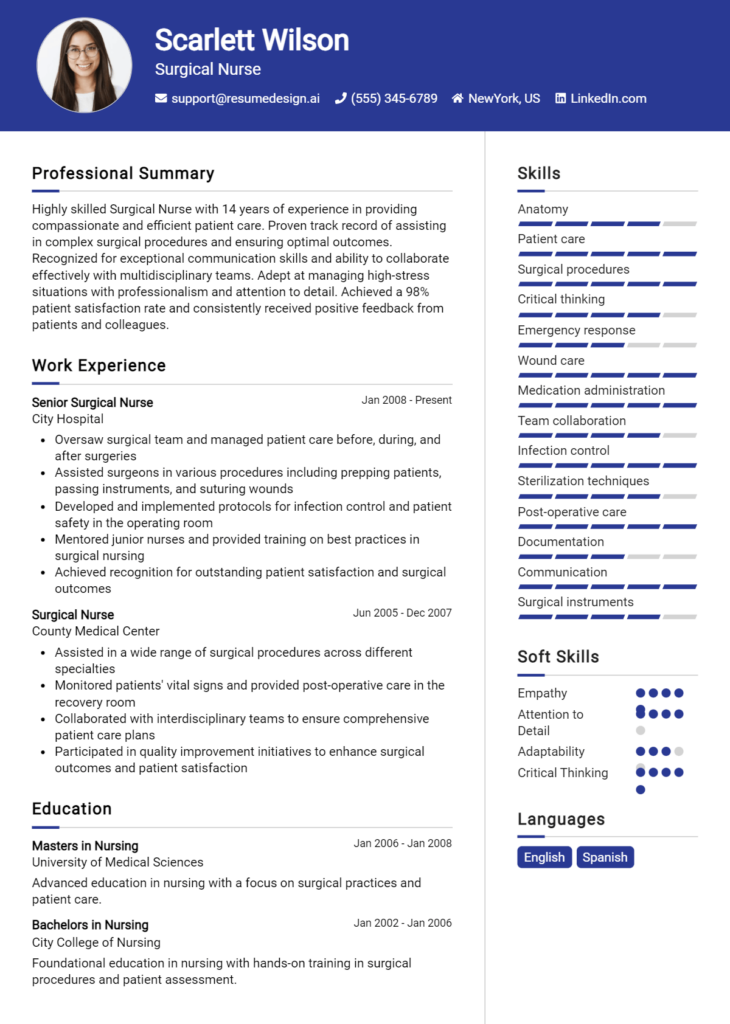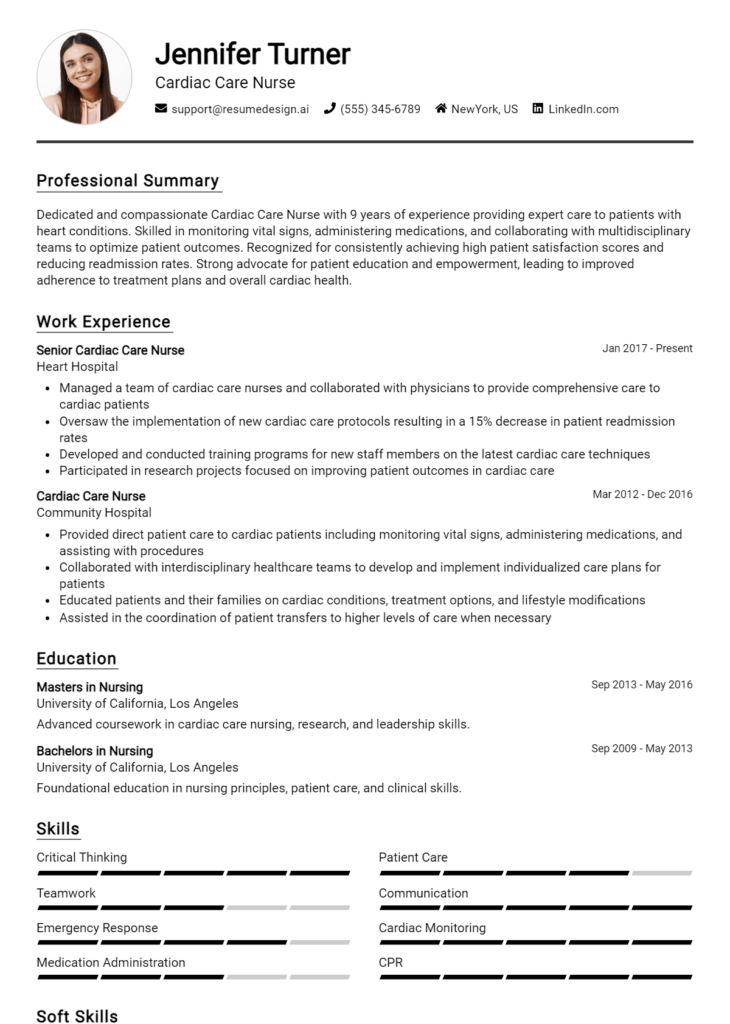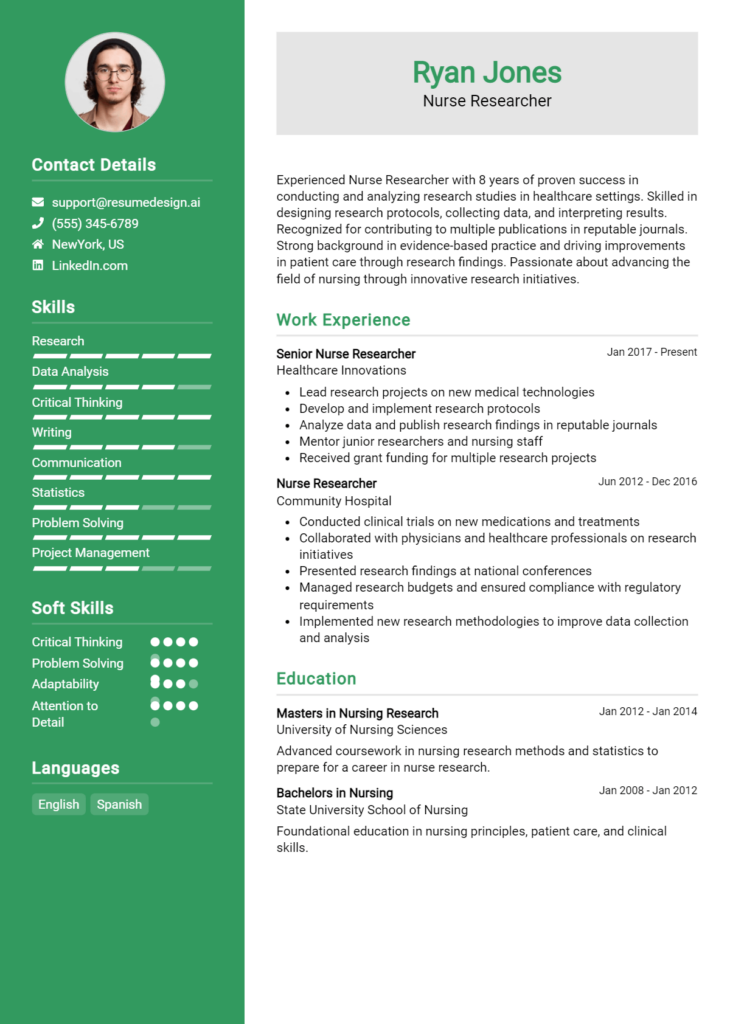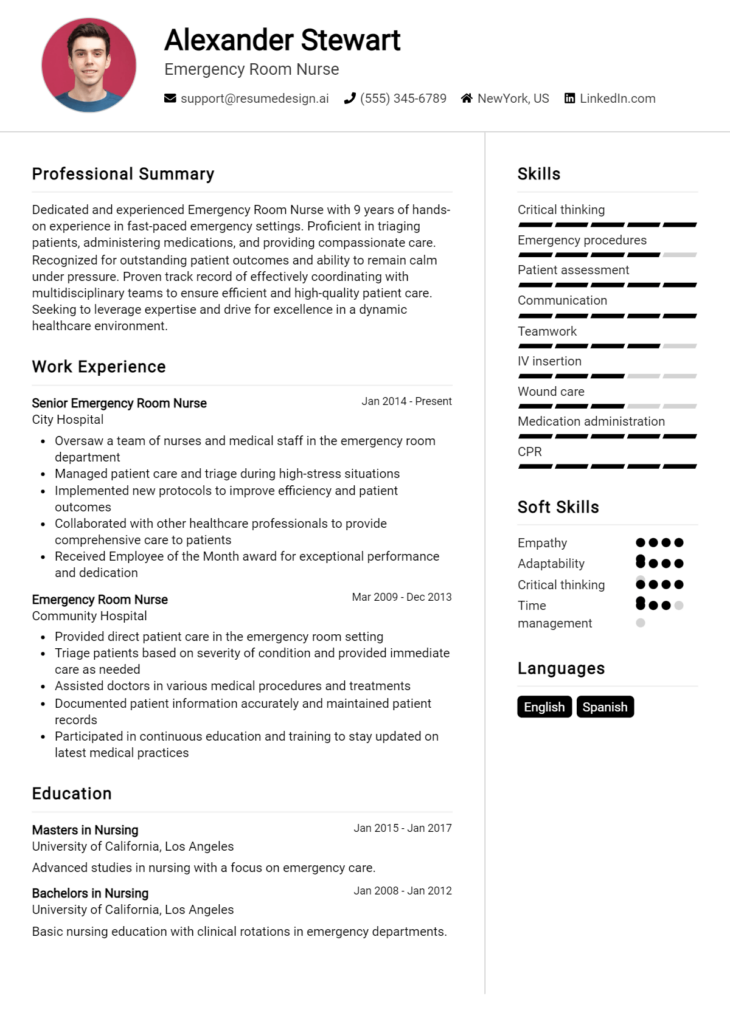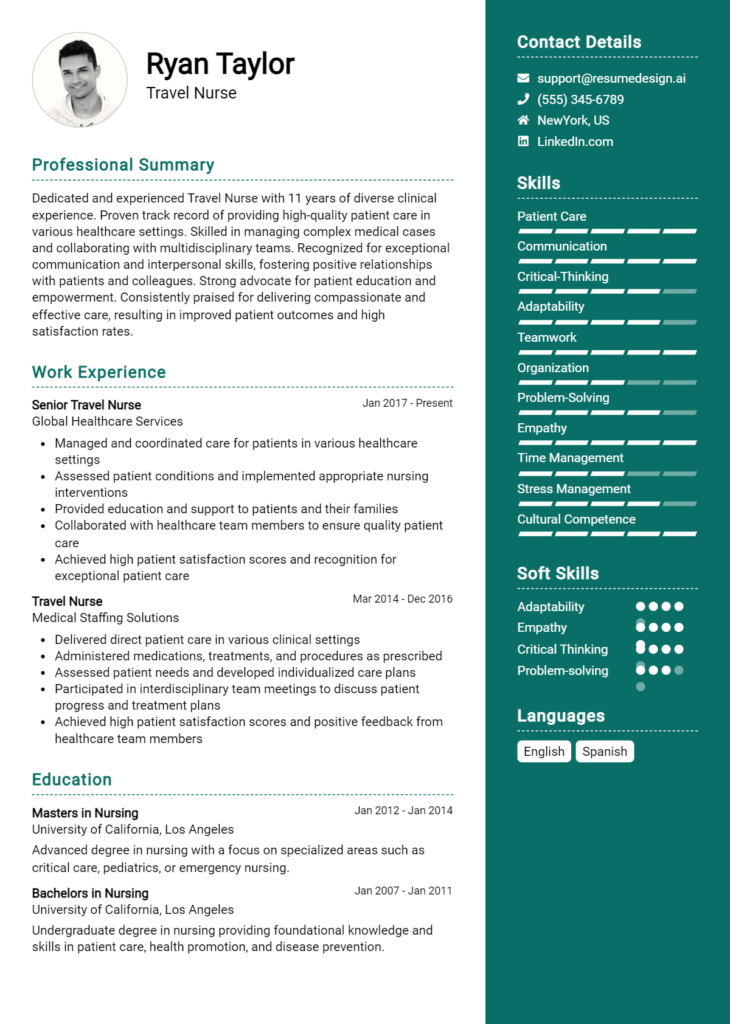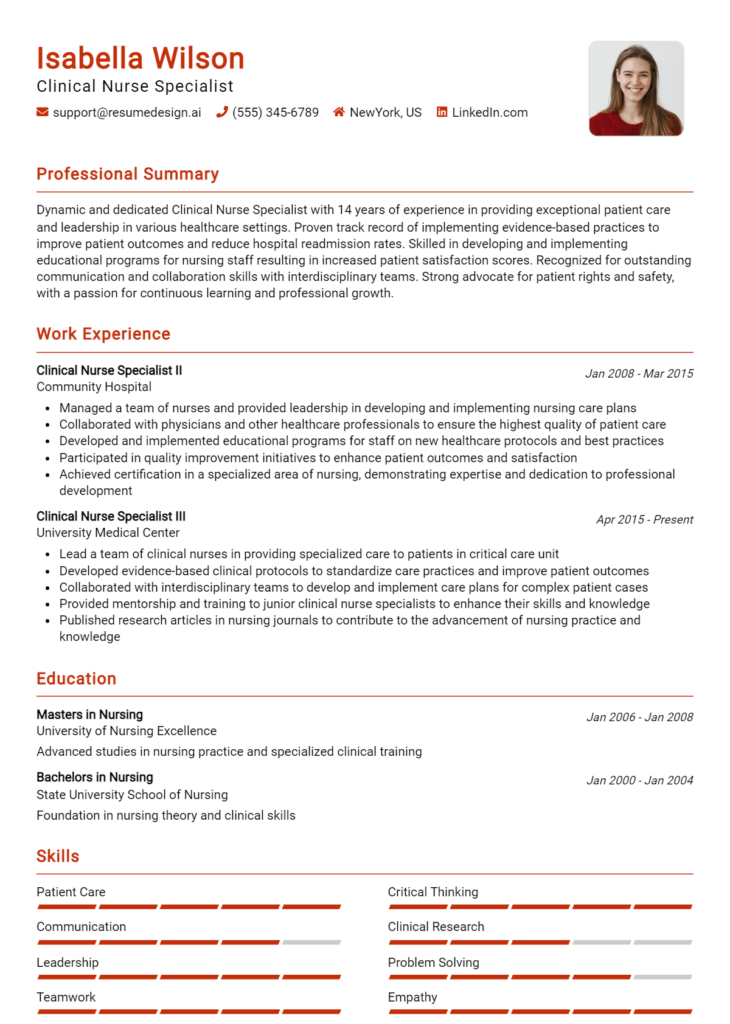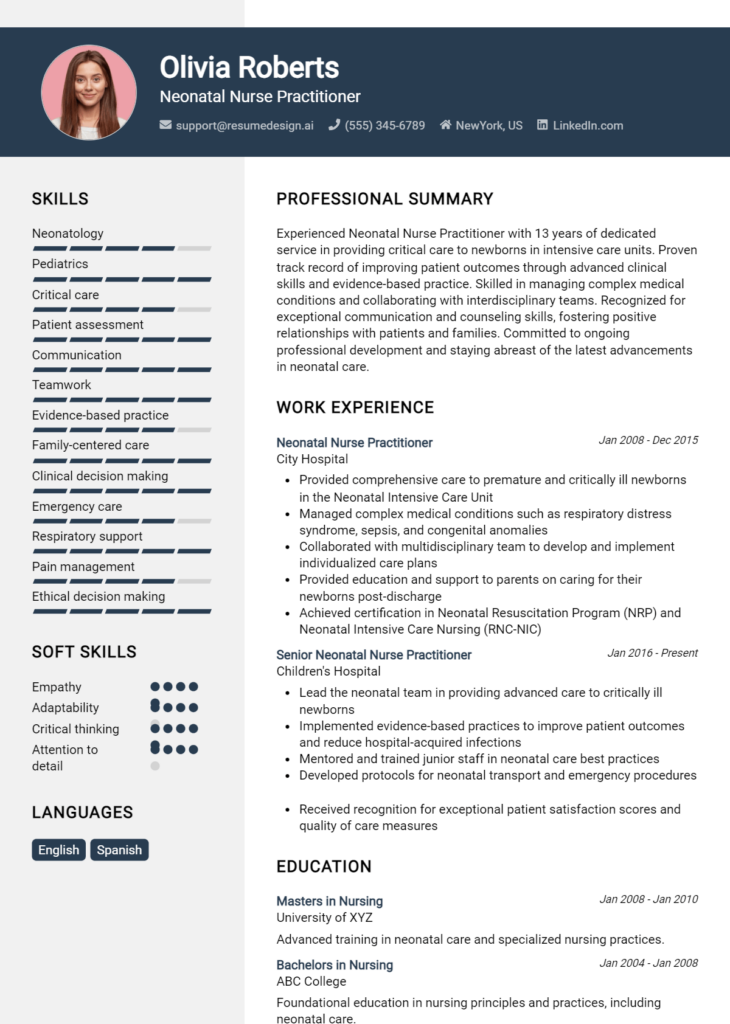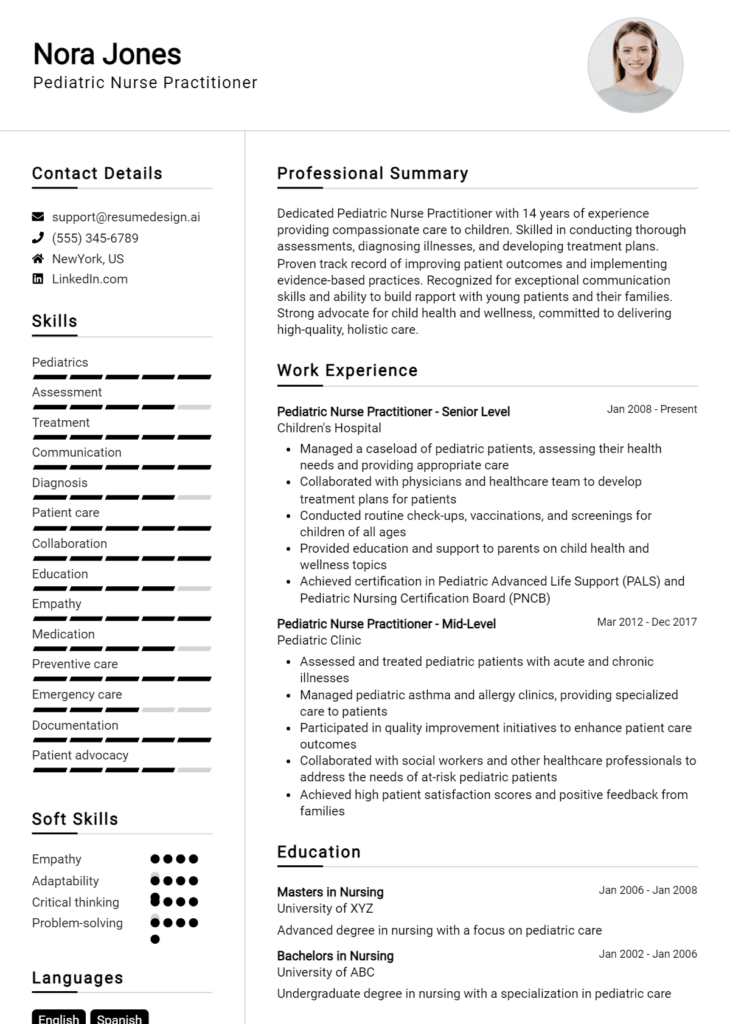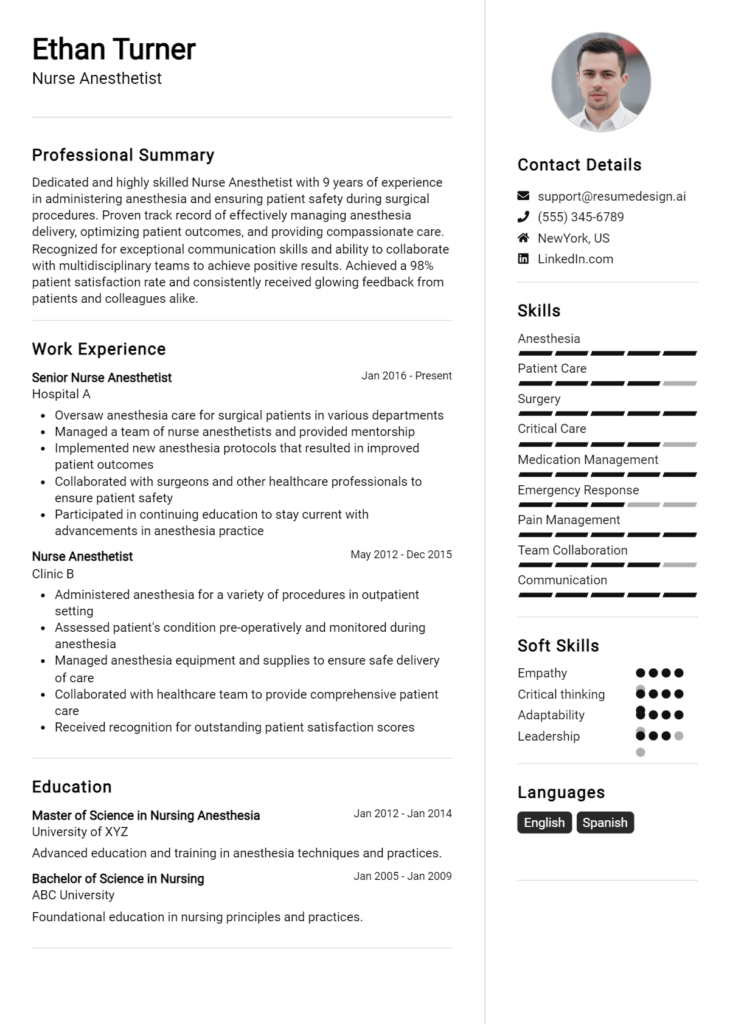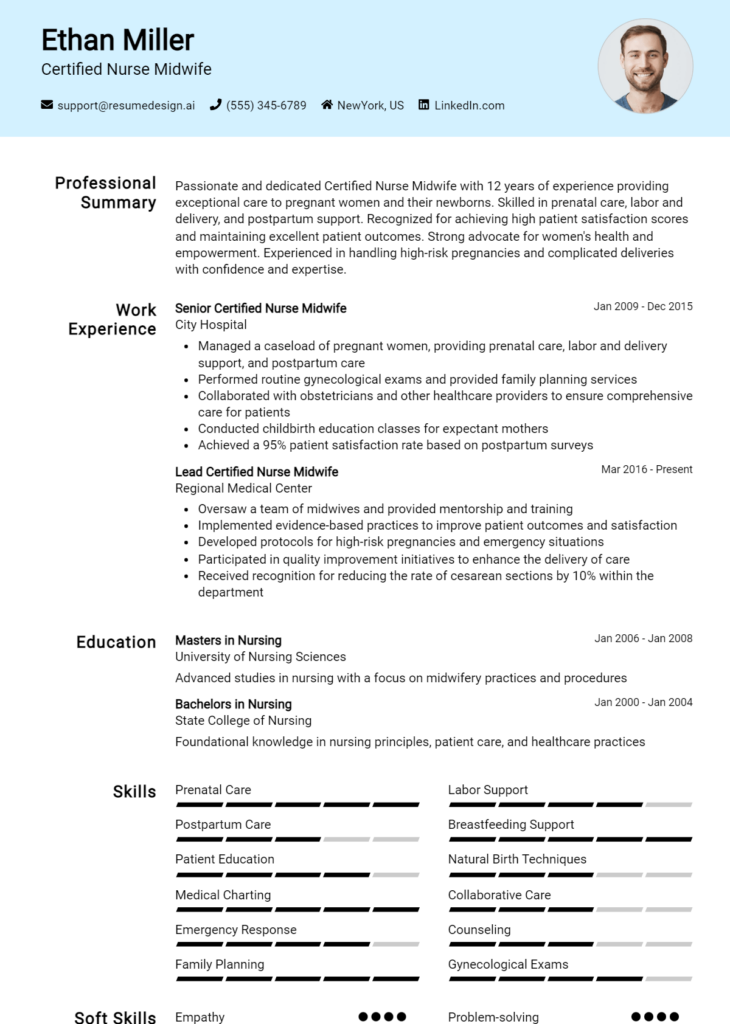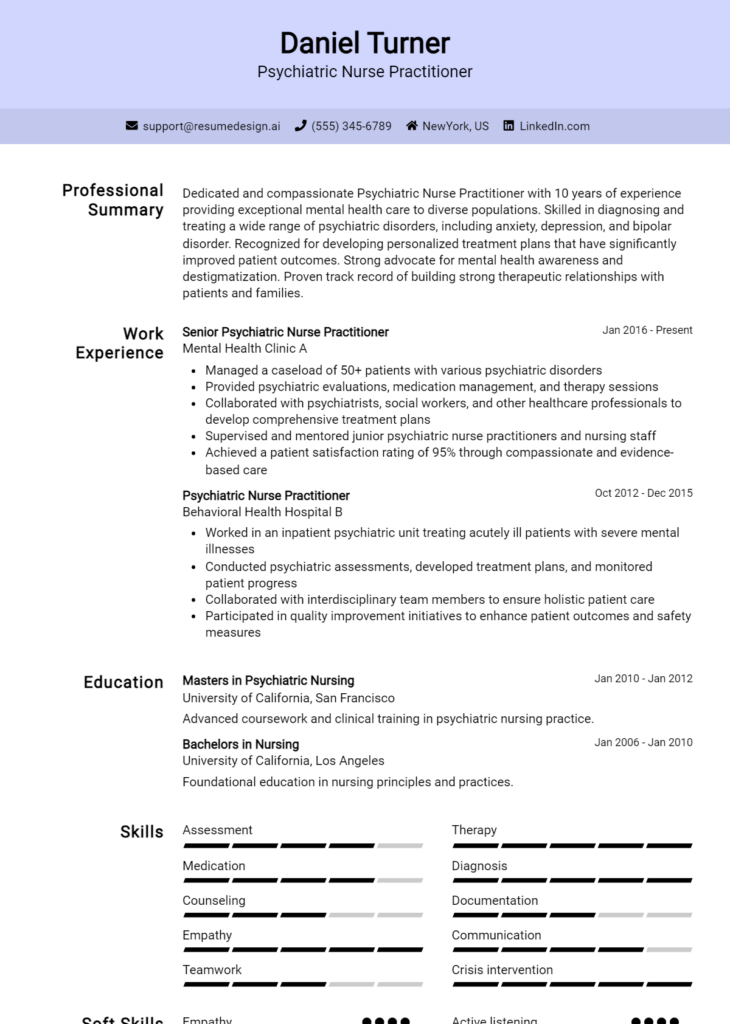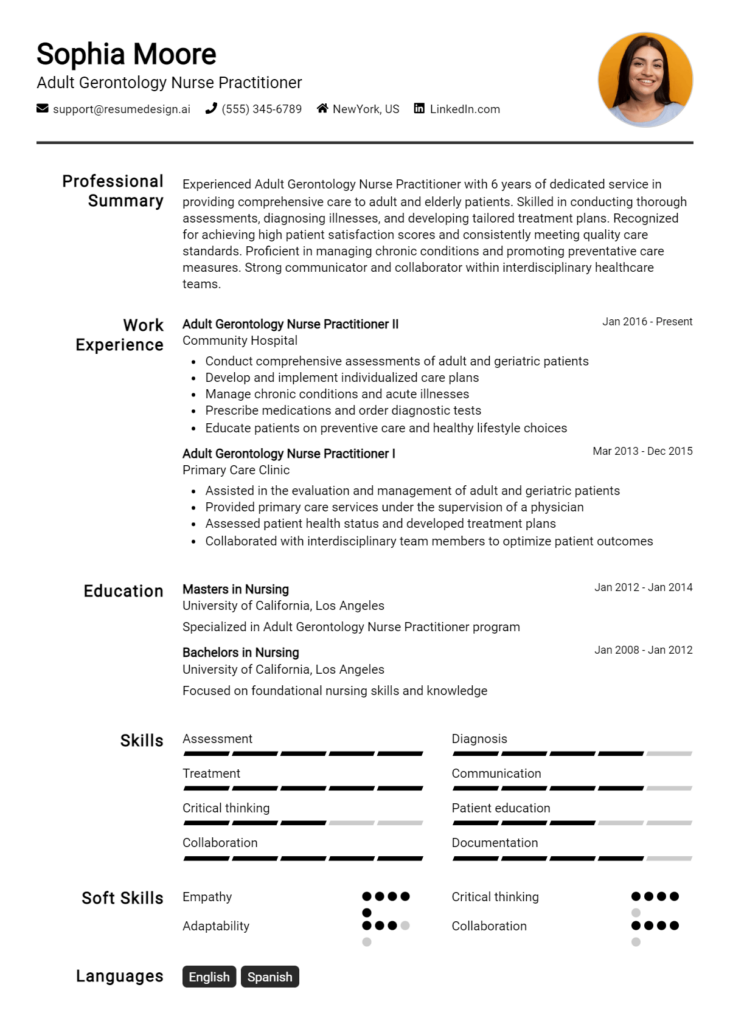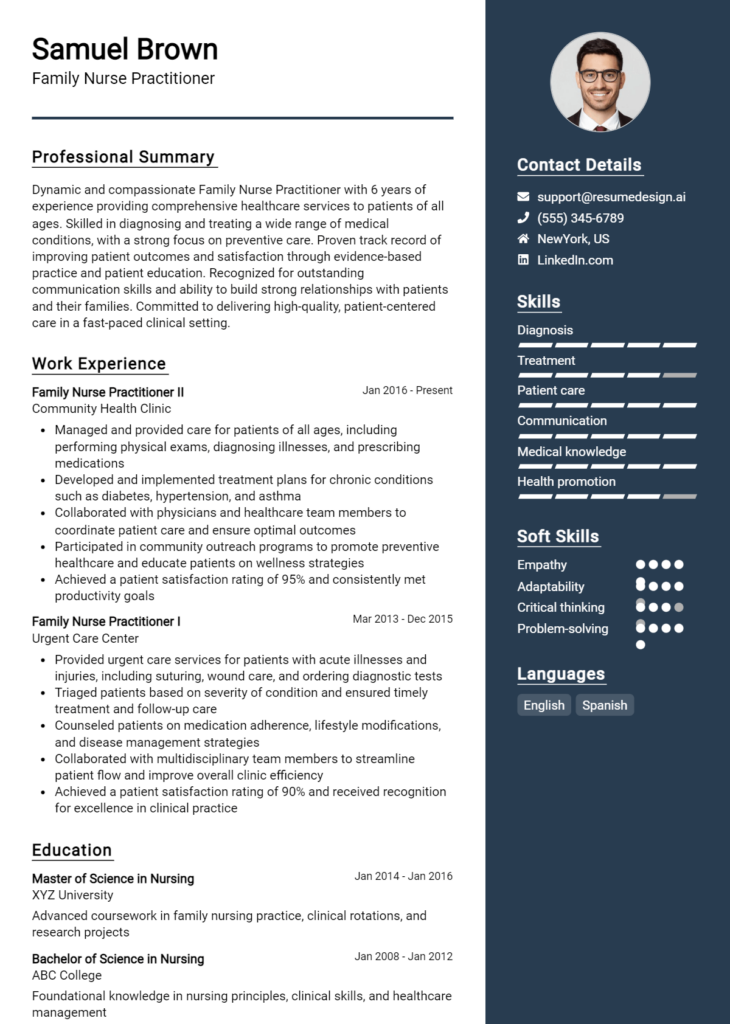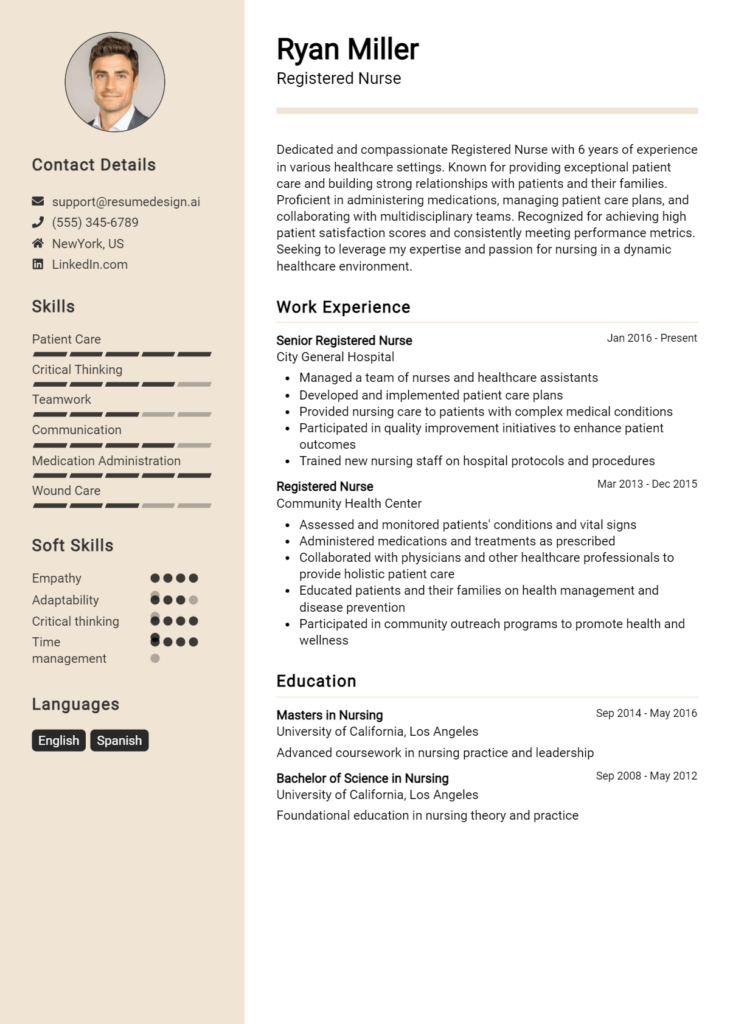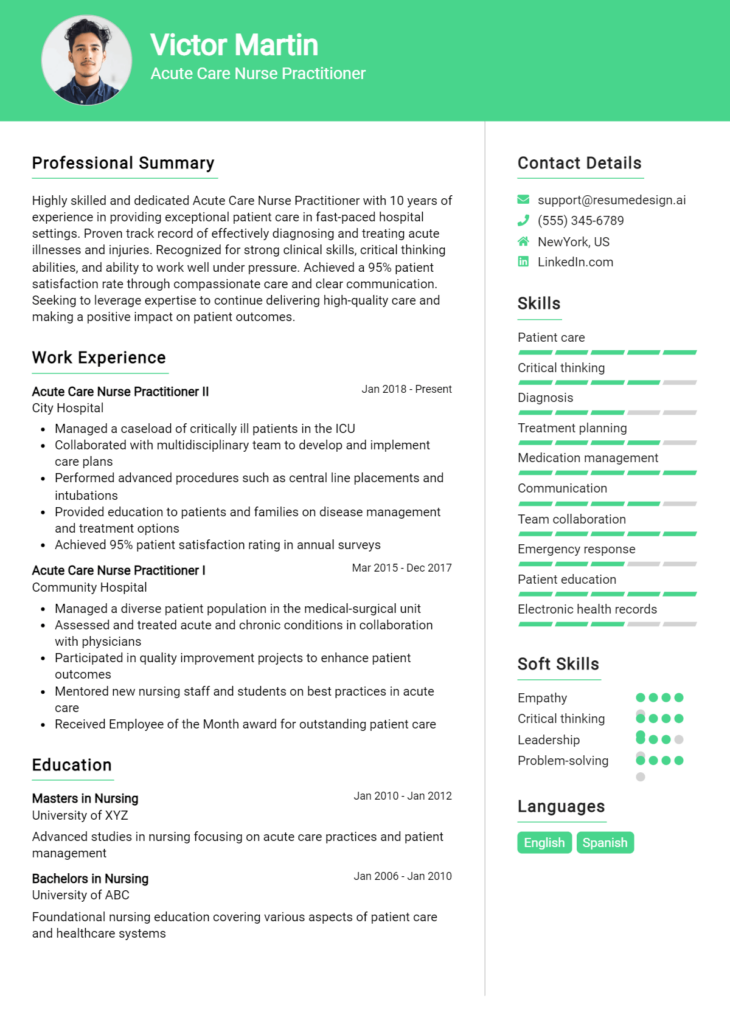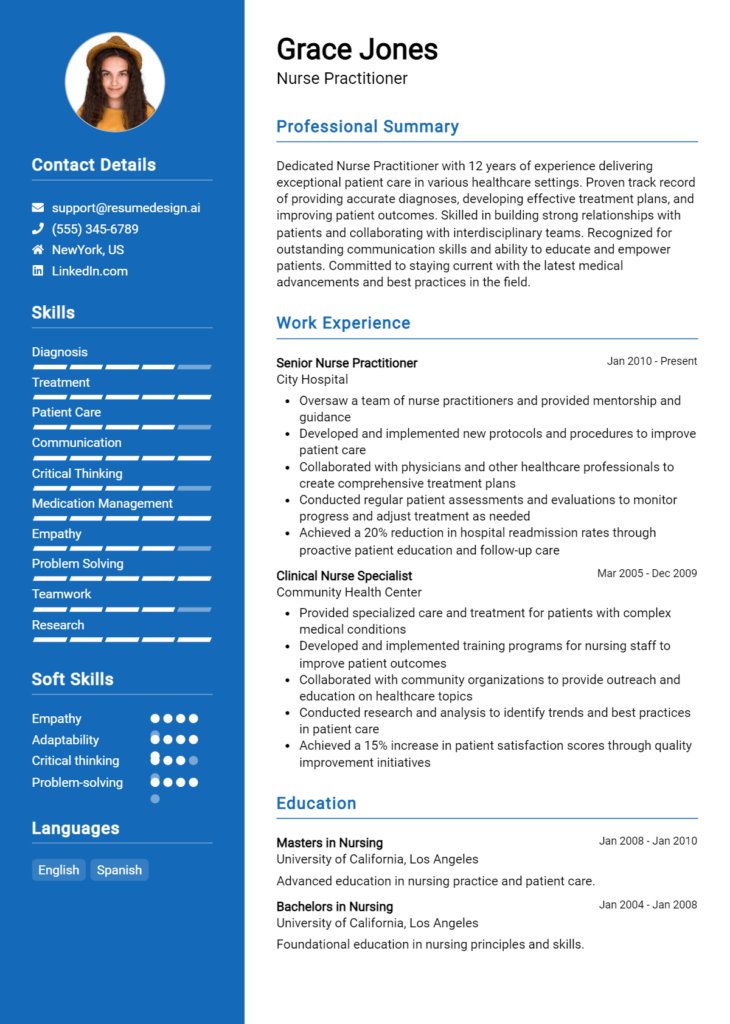Critical Care Nurse Core Responsibilities
A Critical Care Nurse plays a vital role in the healthcare system, providing specialized care to critically ill patients. Their core responsibilities include monitoring vital signs, administering medications, and collaborating with multidisciplinary teams to devise effective treatment plans. Strong technical and operational skills, along with exceptional problem-solving abilities, are essential for this role to ensure timely interventions and improve patient outcomes. A well-structured resume highlighting these qualifications is crucial in showcasing how these skills align with the organization's overarching goals.
Common Responsibilities Listed on Critical Care Nurse Resume
- Monitor and assess patients' vital signs and clinical status
- Administer medications and intravenous therapies
- Collaborate with doctors and healthcare teams for optimal patient care
- Implement and manage complex treatment plans
- Provide emotional support to patients and families
- Conduct diagnostic tests and interpret results
- Educate patients and families on post-care procedures
- Maintain accurate patient records and documentation
- Ensure compliance with health regulations and standards
- Participate in continuous education and training programs
- Assist in emergency situations and critical interventions
High-Level Resume Tips for Critical Care Nurse Professionals
In the highly competitive field of healthcare, a well-crafted resume serves as a vital tool for Critical Care Nurse professionals seeking to make a strong first impression on potential employers. Given the critical nature of their role, it's essential that candidates present a resume that not only highlights their clinical skills and certifications but also showcases their achievements and expertise in high-pressure environments. A strong resume can effectively convey a candidate's ability to provide exceptional patient care and work collaboratively with interdisciplinary teams. This guide will provide practical and actionable resume tips specifically tailored for Critical Care Nurse professionals, helping them to stand out in a crowded job market.
Top Resume Tips for Critical Care Nurse Professionals
- Tailor your resume to match the specific job description, using keywords from the posting.
- Highlight relevant experience in critical care settings, such as ICUs or trauma units.
- Quantify your achievements by including metrics, such as patient recovery rates or reductions in complications.
- Showcase industry-specific skills, such as advanced life support, ventilator management, and patient assessment.
- Include certifications and training relevant to critical care, like CCRN or BLS/ACLS certification.
- Utilize a clean, professional format that enhances readability and emphasizes key information.
- Incorporate a strong summary statement at the top of your resume that encapsulates your qualifications and career goals.
- Highlight your ability to work under pressure and make quick, effective decisions in critical situations.
- List any specialized training or continued education that enhances your capability as a critical care nurse.
By implementing these tips, Critical Care Nurse professionals can significantly enhance their resumes, increasing their chances of landing a position in this demanding field. A focused and effective resume not only illustrates a candidate's qualifications but also their commitment to providing exceptional patient care, making them a strong contender for potential employers.
Why Resume Headlines & Titles are Important for Critical Care Nurse
In the competitive field of healthcare, particularly in critical care nursing, a well-crafted resume headline or title serves as a vital introduction to a candidate's qualifications. It is often the first thing hiring managers notice, making it crucial for it to stand out and encapsulate the candidate’s key strengths in a succinct manner. A strong headline not only grabs attention but also sets the tone for the rest of the resume, immediately conveying relevant experience and skills that align with the job being applied for. Therefore, it should be concise, relevant, and directly related to the role of a Critical Care Nurse, ensuring that it resonates with potential employers right from the start.
Best Practices for Crafting Resume Headlines for Critical Care Nurse
- Keep it concise: Aim for a headline that is brief yet informative, ideally one sentence or a phrase.
- Be role-specific: Tailor your headline to reflect the specific position you are applying for.
- Highlight key qualifications: Include your strongest skills or accomplishments in the headline.
- Use action-oriented language: Employ strong verbs that convey your proactive approach to patient care.
- Incorporate relevant keywords: Utilize industry-specific terminology that aligns with the job description.
- Avoid jargon: While industry terms are important, ensure your headline is easily understood.
- Showcase your credentials: Mention any certifications or specializations that enhance your candidacy.
- Make it impactful: Aim for a headline that leaves a lasting impression and sparks interest in your resume.
Example Resume Headlines for Critical Care Nurse
Strong Resume Headlines
Compassionate Critical Care Nurse with 5+ Years of Experience in High-Acuity Settings
Dedicated RN Specializing in Emergency Response and Advanced Patient Care
Experienced Critical Care Nurse Committed to Excellence in Patient Outcomes and Safety
Innovative Critical Care Nurse with Expertise in Cardiac Monitoring and Life Support Techniques
Weak Resume Headlines
Nurse Looking for a Job
Healthcare Professional
Experienced Nurse
Strong headlines are effective because they directly communicate the candidate’s relevant experience, skills, and commitment to the role, thereby capturing the attention of hiring managers. In contrast, weak headlines fail to impress due to their vagueness and lack of specificity; they do not provide any insight into the applicant's qualifications or how they align with the job requirements. By focusing on impactful language and specific details, strong headlines can significantly enhance a resume's appeal.
Writing an Exceptional Critical Care Nurse Resume Summary
A well-crafted resume summary is crucial for a Critical Care Nurse as it serves as the first impression a hiring manager receives. A strong summary efficiently captures attention by highlighting key skills, relevant experience, and notable accomplishments that align with the demands of the role. This concise and impactful introduction should be tailored specifically to the job the candidate is applying for, allowing them to stand out in a competitive job market. By quickly conveying the nurse's qualifications and passion for critical care, the summary sets the tone for the rest of the resume, increasing the chances of landing an interview.
Best Practices for Writing a Critical Care Nurse Resume Summary
- Quantify Achievements: Use specific numbers to demonstrate the impact of your work, such as patient outcomes or efficiency improvements.
- Focus on Skills: Highlight both hard and soft skills that are relevant to critical care, such as advanced life support, teamwork, and communication.
- Tailor the Summary: Customize your summary to match the job description, using keywords and phrases that reflect the employer's needs.
- Keep it Concise: Limit your summary to 2-4 sentences to maintain the hiring manager's attention and ensure clarity.
- Use Action Verbs: Start sentences with strong action verbs to convey your contributions effectively.
- Highlight Certifications: Mention any relevant certifications or specialized training that enhance your qualifications for critical care nursing.
- Showcase Passion: Reflect your dedication to patient care and the critical care environment to resonate with potential employers.
- Avoid Jargon: Keep language clear and professional without relying on overly technical jargon that may not be universally understood.
Example Critical Care Nurse Resume Summaries
Strong Resume Summaries
Compassionate Critical Care Nurse with over 5 years of experience providing high-quality patient care in ICU settings. Successfully managed a team that improved patient recovery times by 30% through the implementation of evidence-based protocols.
Dedicated Critical Care Nurse with a proven record of enhancing patient outcomes in high-pressure environments. Achieved a 95% patient satisfaction rating while efficiently administering complex medical treatments and collaborating with multidisciplinary teams.
Results-driven Critical Care Nurse with extensive experience in cardiac and trauma care. Certified in ACLS and PALS, recognized for reducing emergency response times by 20% through strategic training initiatives and hands-on mentoring.
Weak Resume Summaries
Nurse with experience in critical care looking for a new job. I have good communication skills and work well with others.
Experienced Critical Care Nurse seeking new opportunities. I have worked in various hospitals and can handle different tasks.
The strong resume summaries are effective because they provide specific examples of achievements, include relevant skills, and use quantifiable data to demonstrate the nurse's impact in their role. In contrast, the weak summaries are vague, lack measurable outcomes, and do not highlight any particular skills or accomplishments, making it difficult for hiring managers to assess the candidate's qualifications or fit for the position.
Work Experience Section for Critical Care Nurse Resume
The work experience section of a Critical Care Nurse resume is crucial as it serves as a testament to the candidate's technical skills and their ability to manage critical situations effectively. This section highlights not only the clinical competencies required in high-pressure environments but also the candidate's capacity to collaborate with multidisciplinary teams and deliver high-quality patient care. By quantifying achievements—such as improved patient outcomes or enhanced team performance—and aligning past experiences with industry standards, candidates can significantly strengthen their appeal to potential employers. This strategic presentation of experience is vital in demonstrating readiness for the complexities of critical care nursing.
Best Practices for Critical Care Nurse Work Experience
- Utilize action verbs to convey your role and responsibilities effectively.
- Quantify achievements with specific metrics, such as patient recovery rates or reduction in response times.
- Highlight technical skills relevant to critical care, such as proficiency in using advanced medical equipment.
- Showcase leadership experiences, including team management and mentoring roles.
- Emphasize collaboration with interdisciplinary teams to enhance patient care.
- Tailor your experience to align with the job description and required competencies of the position.
- Include relevant certifications and training that complement your work experience.
- Use clear and concise language to enhance readability and engagement.
Example Work Experiences for Critical Care Nurse
Strong Experiences
- Led a team of 8 nurses in a high-acuity unit, achieving a 20% reduction in patient transfer times through improved triage protocols.
- Implemented a new electronic health record system that enhanced documentation accuracy, resulting in a 15% decrease in medication errors.
- Coordinated a multi-disciplinary team to establish patient-centered care plans, leading to a 30% increase in patient satisfaction scores.
- Trained and mentored 5 new nursing staff on advanced life support techniques, contributing to a 25% increase in department-wide certification rates.
Weak Experiences
- Worked in a busy hospital with various patients.
- Assisted in patient care and other duties as assigned.
- Participated in meetings and discussions with team members.
- Helped with general nursing tasks and patient management.
The examples provided illustrate the difference between strong and weak experiences in a Critical Care Nurse resume. Strong experiences are characterized by specific, quantifiable outcomes that demonstrate impactful contributions to patient care and team dynamics. They reflect a clear understanding of the critical care environment and highlight leadership and collaboration. In contrast, weak experiences lack detail and specificity, making them less compelling to potential employers. They fail to showcase the candidate's unique skills and achievements, ultimately diminishing their chances of standing out in a competitive job market.
Education and Certifications Section for Critical Care Nurse Resume
The education and certifications section of a Critical Care Nurse resume is vital in establishing the candidate's qualifications and commitment to the nursing profession. This section not only showcases the academic background but also underscores industry-relevant certifications and ongoing learning efforts that are crucial in the ever-evolving field of critical care. By providing information on relevant coursework, specialized training, and recognized certifications, candidates enhance their credibility and demonstrate their alignment with the specific requirements of the job role, ultimately increasing their chances of securing a position in this high-stakes environment.
Best Practices for Critical Care Nurse Education and Certifications
- Prioritize relevant degrees, such as a Bachelor of Science in Nursing (BSN) or a Master of Science in Nursing (MSN).
- Include industry-recognized certifications, like the Critical Care Registered Nurse (CCRN) certification.
- Detail specialized training programs, such as Advanced Cardiac Life Support (ACLS) or Pediatric Advanced Life Support (PALS).
- Highlight any continuing education courses that pertain to critical care nursing.
- Organize educational information chronologically, starting with the most recent qualifications.
- Include GPA if it is strong (generally 3.5 or higher) to demonstrate academic achievement.
- Be concise but thorough, ensuring all entries are relevant and current.
- Consider adding memberships in professional associations, as they can reflect commitment to the profession.
Example Education and Certifications for Critical Care Nurse
Strong Examples
- Bachelor of Science in Nursing (BSN), University of Health Sciences, Graduated May 2021
- Critical Care Registered Nurse (CCRN) Certification, American Association of Critical-Care Nurses, Certified since June 2022
- Advanced Cardiac Life Support (ACLS) Certification, American Heart Association, Renewed March 2023
- Pediatric Advanced Life Support (PALS) Certification, American Heart Association, Certified July 2023
Weak Examples
- Associate Degree in Nursing, Community College, Graduated 2005
- CPR Certification, expired January 2022
- General Studies Degree, State University, Graduated 2019
- Basic Life Support (BLS) Certification, Obtained 2018 (not current)
The examples provided are considered strong because they reflect relevant and recent educational qualifications that align with the requirements of a Critical Care Nurse. They demonstrate ongoing professional development through industry-recognized certifications that are current and applicable to critical care. In contrast, the weak examples signify outdated or irrelevant qualifications that do not contribute to the candidate's credibility in the critical care field, such as non-nursing degrees or expired certifications lacking recent relevance.
Top Skills & Keywords for Critical Care Nurse Resume
In the competitive field of nursing, particularly in critical care, showcasing the right skills on your resume is essential to stand out to potential employers. A Critical Care Nurse not only needs to demonstrate clinical expertise but also a range of interpersonal abilities that contribute to effective patient care. Highlighting these skills can illustrate your qualifications and readiness to handle the high-pressure environment of an intensive care unit. By emphasizing both hard and soft skills, you can create a well-rounded resume that reflects your capabilities and commitment to providing exceptional patient care. For more insights on how to effectively present your skills, check out our guide on skills and work experience.
Top Hard & Soft Skills for Critical Care Nurse
Soft Skills
- Effective communication
- Compassion and empathy
- Critical thinking
- Emotional resilience
- Team collaboration
- Adaptability
- Problem-solving
- Attention to detail
- Time management
- Leadership skills
Hard Skills
- Advanced cardiac life support (ACLS)
- Basic life support (BLS)
- Patient assessment
- Ventilator management
- IV therapy administration
- Medication administration
- Wound care management
- Knowledge of EHR (Electronic Health Records)
- Infection control practices
- Blood transfusion procedures
By including these essential soft and hard skills in your resume, you can effectively convey your readiness for the challenges faced by Critical Care Nurses and enhance your appeal to hiring managers.
Stand Out with a Winning Critical Care Nurse Cover Letter
Dear [Hiring Manager's Name],
I am writing to express my interest in the Critical Care Nurse position at [Hospital/Institution Name] as advertised on [Job Board/Website]. With over [X years] of experience in critical care environments and a strong commitment to providing high-quality patient care, I am excited about the opportunity to contribute to your team. My expertise in monitoring and managing critically ill patients, combined with my ability to work collaboratively in high-pressure settings, aligns well with the values and goals of your esteemed institution.
Throughout my career, I have developed a comprehensive skill set that encompasses advanced life support techniques, patient assessment, and the ability to make swift, informed decisions in emergency situations. At [Previous Employer/Institution], I played a pivotal role in a multidisciplinary team, ensuring that every patient received personalized care tailored to their specific needs. My meticulous attention to detail and my strong communication skills have enabled me to effectively educate patients and their families about complex medical conditions, fostering a supportive and understanding environment during their most vulnerable times.
Moreover, I am dedicated to continuous professional development and have pursued ongoing education in critical care nursing practices and technologies. I hold certifications in [relevant certifications, e.g., CCRN, BLS, ACLS], and I am always eager to learn new techniques and methodologies that enhance patient care. I am particularly drawn to [Hospital/Institution Name] because of its commitment to innovation and excellence in patient care, and I am eager to bring my skills and passion for nursing to your team.
Thank you for considering my application. I look forward to the opportunity to discuss how my background, skills, and enthusiasms can contribute to the exceptional care provided at [Hospital/Institution Name]. I am excited about the possibility of working together to make a difference in the lives of patients and their families.
Sincerely,
[Your Name]
[Your Contact Information]
Common Mistakes to Avoid in a Critical Care Nurse Resume
Crafting a resume for a Critical Care Nurse position requires attention to detail and a clear presentation of your skills and experiences. Unfortunately, many applicants make common mistakes that can hinder their chances of landing an interview. Understanding these pitfalls can help you create a more compelling resume that highlights your qualifications effectively. Below are some common mistakes to avoid:
Generic Objective Statements: Using a vague or generic objective statement fails to convey your specific goals or how you can contribute to the employer. Tailor your objective to the role and organization.
Neglecting Relevant Certifications: Failing to prominently display critical certifications such as ACLS (Advanced Cardiovascular Life Support) or CCRN (Critical Care Registered Nurse) can lead to your resume being overlooked, as these credentials are often prerequisites.
Lack of Quantifiable Achievements: Instead of simply listing job duties, include quantifiable achievements that demonstrate your impact, such as improved patient outcomes or reduced response times.
Inconsistent Formatting: A resume that lacks consistent formatting—such as font sizes, bullet styles, and spacing—can appear unprofessional and difficult to read. Maintain a clean and organized layout.
Overloading with Medical Jargon: While it’s important to demonstrate your medical knowledge, overloading your resume with technical jargon can confuse hiring managers. Use clear language that highlights your expertise without being overly complex.
Ignoring Soft Skills: Critical care nursing is not only about clinical skills; soft skills such as communication, teamwork, and empathy are equally important. Be sure to highlight these qualities in your resume.
Including Irrelevant Experience: Listing unrelated work experience can dilute the focus of your resume. Prioritize clinical roles and experiences that directly relate to critical care nursing.
Not Tailoring for Each Application: Sending out the same resume for different positions can hurt your chances. Tailor your resume for each job application by aligning your skills and experiences with the specific requirements of the role.
Conclusion
As a Critical Care Nurse, you play a vital role in saving lives and providing high-quality care to patients facing life-threatening conditions. The demands of this job require not only advanced medical knowledge and clinical skills but also the ability to work effectively under pressure and communicate compassionately with both patients and their families. Key points to consider include the importance of certifications, ongoing education, and the ability to collaborate with a multidisciplinary team.
To ensure you stand out in this competitive field, it's essential to have a polished and professional resume that highlights your skills and experiences. Take the time to review and update your Critical Care Nurse resume, ensuring it reflects your qualifications and accomplishments accurately.
We encourage you to utilize the resources available to enhance your resume. Explore our resume templates to find a design that fits your style, or try our resume builder for a user-friendly way to create a professional resume tailored for critical care nursing. Additionally, check out our resume examples for inspiration and our cover letter templates to complement your application. Your next opportunity in critical care nursing could be just a well-crafted resume away!

